Blood Sisters, Sisters (1973)
Directed by: Brian De Palma
Written by: Brian De Palma, Louisa Rose
Starring: Charles Durning, Jennifer Salt, Margot Kidder
HCF may be one of the newest voices on the web for all things Horror and Cult, and while our aim is to bring you our best opinion of all the new and strange that hits the market, we still cannot forget about our old loves, the films that made us want to create the website to spread the word. So, now and again our official critics at the HCF headquarters have an urge to throw aside their new required copies of the week and dust down their old collection and bring them to the fore…. our aim, to make sure that you may have not missed the films that should be stood proud in your collection. This week we present the first of two early works by Brian De Palma, both of which are suspense thrillers with a dark twist, and which are amongst his lesser seen movies.
HCF REWIND NO.44 SISTERS [1973]
AVAILABLE ON DVD
DIRECTED BY: Brian De Palma
WRITTEN BY: Brian De Palma, Louisa Rose
STARRING: Margot Kidder, Jennifer Salt, Charles Durning, William Finley
RUNNING TIME: 92 mins
REVIEWED BY:Dr Lenera, Official HCF Critic
On “The Peeping Toms’, a game show seeing if people will look at something they shouldn’t or not, Philip Woode, an insurance seller, does not stay to watch Danielle Breton, a model who pretends to be blind and undresses in front of him. Philip wins a dinner-for-two and Danielle wins a cutlery set. Afterwards, the two hit it off so both go to the dinner and then to Danielle’s apartment, despite being bothered by Danielle’s strange ex-husband Emil. The two spend the night together. The next morning, Danielle, who has a strange scar on her side, feels ill and has to rush to the bathroom to take a pill. When Philip awakes, he hears Danielle and her sister Dominique arguing about him, Dominique being against Philip being there. Feeling really bad, Danielle asks Philip to go to the chemist to get her some more pills, which he does, and also buys the two sisters a birthday cake. Returning to the apartment, it is Dominique, not Danielle, who is waiting for him………..
Sisters is the first of Brian De Palma’s several stylish, Alfred Hitchcock-influenced suspense thrillers that he made after making anarchic small-budget pictures such as Hi Mom. It isn’t really one of his best, certainly not reaching the heights of Dressed To Kill or Obsession, or indeed some of his other great movies such as Carrie and The Untouchables. At times it seems more a case of the director trying things out, things that he would do better in successful films, and I think the movie could have done with a few more scenes of tension, but it’s still an enjoyable viewing experience and already showcases De Palma’s interests in things like voyeurism, blood and women in peril. It was inspired by the case of Soviet Siamese twins Masha and Dasha Krivoshlyapova who had differing personalities and psychological problems after their separation. Originally intended to star Raquel Welch, I think viewers should be glad that didn’t happen; as pretty as she was, she was an awful actress and could not played the dual role that ended up going to Margot Kidder. The film was a commercial success and there are some who claim De Palma never bettered it; I totally disagree, but Sisters is certainly a fascinating film to re-watch in the context of his later work…and of course Hitchcock.
De Palma has often been regarded as a director who just blatantly copies others, especially The Master Of Suspense. Watching Sisters, one can certainly see evidence of that. The storyline and structure is clearly derived from that of Psycho; you even see the supposed ‘heroine’ killed off a third of the way through, while there’s also a bit of Rear Window in there too. The camerawork and editing is also very Hitchcock-like, but is a bit more experimental at times, and this is the thing I suppose. De Palma may have liked to borrow from elements and stories in Hitchcock movies, and shoot scenes like him, while he was certainly interested in subjects Hitchcock was, but he took them further and found his own style along the way. Hitchcock on drugs one might say! To me, a De Palma film has just as much a distinctive style as a Hitchcock film, and while my love for Hitchcock has no bounds, when De Palma was at his best, he was as good as him, or even better. In my opinion, of course!
Sisters certainly gets off to a good start, with an image of two growing foetus in the opening credits set to Bernard Herrmann’s blaring theme music, a dynamic, twisted version of a children’s chant with great use of two Moog synthesisers followed by two string lines, one ascending, one descending, which parallel each other and cross -“Siamese twin music”, as the composer said. De Palma actually intended to have no music during the titles, but Herrmann convinced him that, because nothing nasty happens for half an hour, the audience needed to be told right from the offset that it eventually would. The first actual scene of the movie is a typical De Palma combination of titillation and cheating, with a man witnessing a woman strip actually being part of a game show. A bit of rudeness combined with downright dirty audience manipulation; two things which would be De Palma trademarks and are already on show in Sisters.
Sisters can almost exactly be divided into three sections of almost equal length; the slow build up to the murder, reporter Grace Collier, who witnesses the killing, doing her investigation, and the dreamlike, almost surreal climactic scenes set in a mental asylum. The first section is a careful build up with ominous details; Danielle’s scar on her side, her creepy stalker of an ex-husband, her strange red pills. Then we have the murder, which is brilliantly built up to with Philip approaching who he thinks is Danielle in bed with a birthday cake and a rather large knife. Danielle, or rather Dominique, takes the knife and lunges right towards the camera, followed by, in shadow, her putting the knife in Philip’s mouth. Overall the killing is no match for the Psycho shower stabbing which is its obvious inspiration; much of it consists of the very bloody Philip crawling across the floor, but, combined with of course that theme music, it has considerable effect when seen for the first time and was originally slightly cut in UK cinemas [of course now the uncut version only merits a ‘15’].
The second section introduces our actual heroine and the film’s pace stalls, though the scenes between Grace and her mother [who was actress Jennifer Salt’s mother in real life] have considerable humour, as do Grace’s interactions with the cops who don’t believe she saw a murder and Charles Durning’s private eye she enlists to help her. The Siamese Twin element is brought in and it’s in a rather sensationalist way that would probably be considered politically incorrect these days. Sisters doesn’t really catch fire again though until the final third, where, in lieu of the expected chasing around, we are given an extended nightmare sequence where we learn all the missing gaps in the story but Grace, who is drugged, experiences them and imagines she is Dominique. Shot in black and white and containing deliberately jarring elements like nuns, dancing Siamese triplets and characters from elsewhere in the film, these hallucinatory scenes are quite disturbing and almost have a David Lynch feel about them. At one point Emile, Danielle’s ex-husband, makes love to Danielle while Grace is joined to her. It’s a audacious way to climax a film, though equally brave is the blackly humorous, ironic wrap-up. Hitchcock felt the need to finish Psycho in a way that tied everything up neatly. De Palma rightly realised 70s audience didn’t require that sort of thing anymore.
One of the things I like most about De Palma’s films is the sheer joy he conveys in filmmaking. His films are not about subtlety, they are about lengthy steadicam shots [this one has a fantastic one going through the hall of the lunatic asylum], split screen, zooms into small details, music that is actually a character in itself, clothes or sets that are white or pale coloured because blood shows up better on them. Margot Kidder is superb in her dual role, even putting on a very good French-Canadian accent, while Jennifer Salt is one of De Palma’s coolest heroines, a seemingly streetwise but very vulnerable feminist with a nose for trouble. I would have liked to have seen her character in another film. Herrmann’s jolting, eerie score has already been mentioned, avoiding actual melody but really getting under the skin. Sisters doesn’t entirely hang together, and it could really do with tightening or the addition of a couple of extra thrill scenes, but I still like it very much as it is [I’ve never bothered yet with the 2006 remake of the same name, though maybe one day!]. It shows a director really flexing his muscles for the first time, and you trace many of his later films back to this one. His next thriller [though not his next film] would be the wonderful Obsession, review coming soon!


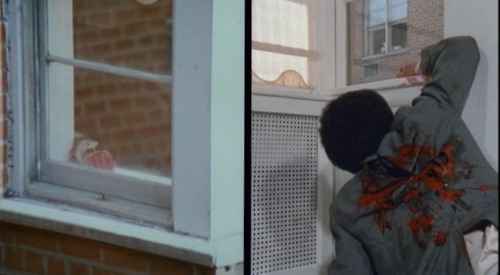
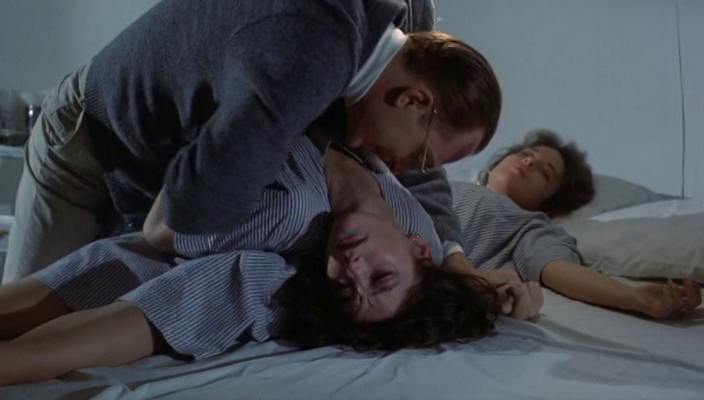



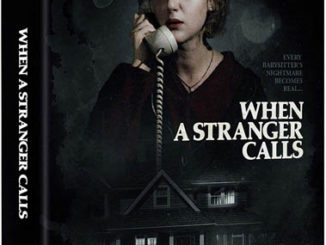
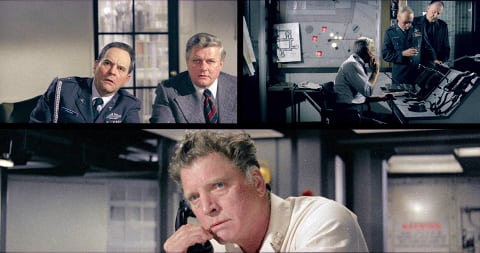
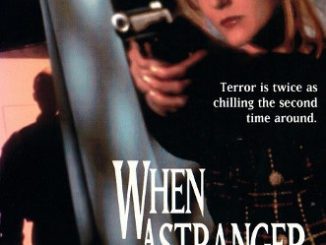
Be the first to comment